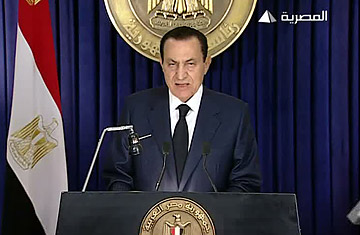
Egyptian President Hosni Mubarak addresses the nation on state television
As Egypt's extraordinary uprising edged into its second week, hundreds of thousands of people poured into Cairo's giant Tahrir Square on Tuesday, in the biggest demonstration the country has seen in decades. Jammed into the huge open area, people waved the national flag and prayed on their knees long after dark, flaunting the nighttime curfew, as they chanted their demand for President Hosni Mubarak's ouster with a single word: "Go!"
But what will the protesters do now that it seems likely Mubarak will not "go" immediately?
By essentially stepping aside and not running for re-election in a vote that was originally scheduled for September, Mubarak may satisfy enough of a populace that has grown weary of lawlessness and shortages — enough to sap the street action of much of its power. Some political groups may even be happy if they are given Cabinet positions as part of an immediate sharing of power in a transition, further eroding opposition unity.
Protesters say they — and Egypt — have been profoundly changed by the past week's experience, and many vow to maintain their almost nonstop demonstrations until the President goes. Yet Tuesday's street-filling crescendo may be impossible to re-create. "It is a fiasco if the situation just stays like this," says the well-known Egyptian actor Aser Yasin, who joined Tuesday's protest in the square. "We have already won. But it is not just about winning. It is about rising up again afterward."
Despite the urgency to find an alternative to Mubarak, almost no protester among many interviewed on Tuesday could name a substitute for the President. A few named political parties like the Muslim Brotherhood or the opposition movement now headed by former International Atomic Energy Agency chief Mohamed ElBaradei. Echoing the responses of others, Mahmoon, a surgeon, says simply, "First we have to change everything, then we will see. We will have a transition, then maybe elections in 12 months."
Keeping that public and political stamina going — and maintaining the revolt's momentum — will not be easy. Cairo has come to a near standstill in the past week, its banks and stock exchange shut, its cash machines out of money and its supermarkets out of bread. Landing in Cairo early on Tuesday, I saw a city under virtual military occupation. Long columns of tanks and armored personnel carriers sat parked alongside the airport highway, and in a 15-minute drive, we passed five military checkpoints and three checkpoints erected by residents' groups to protect their neighborhoods. Cairo's economic turmoil is intensifying. Abubakr Makhlouf, 33, who runs a small high-tech company in Cairo, says he shut his business and sent his staff of six home "until further notice," since he was unable to do any work with the banks closed. Other businesses and stores have done the same.
But Makhlouf and other protesters in Tahrir were steadfast in their commitment. "There is no turning back now. We have nothing else to lose," says Makhlouf, standing in the square, a winter coat under his arm in preparation for staying through much of the night. Asked how long the protesters can occupy the square, he says, "Weeks, months. It all boils down to the stamina of the people."
